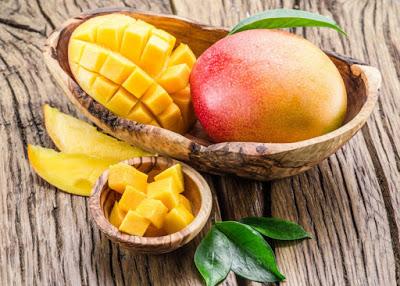
Come summer and there is a delightful sight of juicy mangoes everywhere till yesteryear this sight used to bring only joy, and now the onset of mango season brings these questions along, Are mangoes fattening? Do mangoes have a lot of sugar? Should I eat mangoes or skip it?
Let us know more about mangoes to know the answers to these questions
What kind of nutrition does a Mango Have?
One cup of diced mango provides
- 100 calories
- 1 gram of protein
- 0.5 grams of fat
- 25 grams of carbohydrate (24 grams of sugar and 3 grams of fiber)
- 100 percent of the daily need for vitamin C
- 35 percent of vitamin A
- 20 percent of folate
- 10 percent of vitamin B-6
- 8 percent of vitamin K and potassium
Mangoes also contribute copper, calcium, and iron to the diet as well as antioxidants such as zeaxanthin and beta-carotene.
This rich nutrition content put mangoes into the category of super-fruit despite being high on sugar…
What can eating Mangoes do for you?
Soothe Digestion
Mango contains enzymes that help in breaking down protein. The fibrous nature of mango helps in digestion and elimination. It is rich in pre-biotic dietary fiber, vitamins, and minerals.
Weight Loss Aid
Mango has a lot of vitamins and nutrients that help the body feel fuller. Also, the fibrous fruit boosts the digestive function of the body by burning additional calories, helping in weight loss.
Regulate Diabetes
Some evidence suggests that mango consumption can help regulate blood sugar levels due to its high fiber and antioxidant content.
Fight cancer
Mangoes are rich in tartaric acid, malic acid, and traces of citric acid that primarily help in maintaining the alkali reserve of the body. This is an important reason why mango by itself is great for your body. Remember that cancer cannot survive in an alkaline environment and so, is obesity.
Regulate cholesterol levels
Mango has a high level of vitamin C, pectin, and fibers that help to lower serum cholesterol levels. Fresh mango is a rich source of potassium, which is an important component of cell and body fluids that helps to control heart rate and blood pressure.
Maintain Eye health
A Mango fulfills 35 percent of daily need of vitamin A. Mangoes help in promoting good eyesight, fights dry eyes, and also prevent night blindness.
Why Mango is considered fattening?
Mangoes are high on carbohydrate hence excess intake above your calorie limit may lead to weight gain. However, moderation and exercising portion control will prevent it. In fact, mangoes promote healthy weight control as the phytochemicals present in mangoes suppress fat cells activity and fat-related genes.
What is the right way to eat Mangoes?
Soak mangoes in water for 30 minutes before eating.it will enhance their cooling effect and will remove excess phytic acid.
Avoid eating mangoes after a meal as dessert which is the consumption of extra calories and has a more likely hood to be stored as fat. Top up your mango with some nuts or seeds like almonds or flaxseeds chia seeds and this will work as a weight loss booster.
While eating a mango as a fruit in mid-morning or evening snack in controlled portions is absolutely fine. One can also make a Breakfast superfood smoothie by adding mango + yogurt + chia seeds.
To sum up-
Despite being high on calories and sugar, it’s not the Mango which is making you fat it’s either overeating of Mango or eating it at the wrong time .. which is responsible for the so-called ‘fattening menace’ associated with it. So let’s not blame the Mango the king of fruits which nourishes your body and delights your taste buds at the same time.

